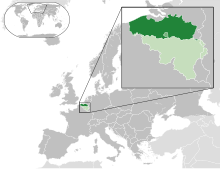Vlamingen (Dutch) | |
|---|---|
 Flag of Flanders, the symbol of the Flemish people. | |
 Flemish Community in Belgium and Europe | |
| Total population | |
| c. 7 million (2011 estimate) | |
| Regions with significant populations | |
| 6,450,765[1] | |
| Indeterminable[a] (352,630 Belgians)[2] | |
| 187,750[3] | |
| 13,840–176,615[b][4] | |
| 55,200[3] | |
| 15,130[3] | |
| 6,000[3] | |
| Languages | |
| Dutch (East Flemish, West Flemish, Brabantian, Limburgish) | |
| Religion | |
| Predominantly and historically Roman Catholic with Protestant minority[a] Increasingly irreligious | |
| Related ethnic groups | |
| Dutch, Walloons, Afrikaners, Vilamovians, Germans, English | |
^a U.S. population census does not differentiate between Walloons and Flemish, therefore the number of the latter is unknown. ^b In 2011, 13,840 respondents stated Flemish ethnic origin. Another 176,615 reported Belgian. See List of Canadians by ethnicity | |
| Person | Fleming (Vlaming) |
|---|---|
| People | Flemings (Vlamingen) |
| Language | Flemish (Vlaams), VGT (Vlaamse Gebarentaal) |
| Country | Flanders (Vlaanderen) |
Flemish people or Flemings (Dutch: Vlamingen [ˈvlaːmɪŋə(n)] ) are a Germanic ethnic group native to Flanders, Belgium, who speak Flemish Dutch. Flemish people make up the majority of Belgians, at about 60%.
Flemish was historically a geographical term, as all inhabitants of the medieval County of Flanders in modern-day Belgium, France and the Netherlands were referred to as "Flemings" irrespective of their ethnicity or language.[5] The contemporary region of Flanders comprises a part of this historical county, as well as parts of the medieval duchy of Brabant and the medieval county of Loon, where the modern national identity and culture gradually formed.
- ^ "Structuur van de bevolking – België / Brussels Hoofdstedelijk Gewest / Vlaams Gewest / Waals Gewest / De 25 bevolkingsrijke gemeenten (2000–2006)" [Structure of the population - Belgium / Brussels-Capital Region / Flemish Region / Walloon Region / The 25 populated municipalities (2000-2006)] (in Dutch). Belgian Federal Government Service (ministry) of Economy – Directorate-general Statistics Belgium. 2007. Retrieved May 23, 2007.— Note: 59% of the Belgians can be considered Flemish, i.e., Dutch-speaking: Native speakers of Dutch living in Wallonia and of French in Flanders are relatively small minorities which furthermore largely balance one another, hence counting all inhabitants of each unilingual area to the area's language can cause only insignificant inaccuracies (99% can speak the language). Dutch: Flanders' 6.079 million inhabitants and about 15% of Brussels' 1.019 million are 6.23 million or 59.3% of the 10.511 million inhabitants of Belgium (2006); German: 70,400 in the German-speaking Community (which has language facilities for its less than 5% French-speakers), and an estimated 20,000–25,000 speakers of German in the Walloon Region outside the geographical boundaries of their official Community, or 0.9%; French: in the latter area as well as mainly in the rest of Wallonia (3.414 - 0.093 = 3.321 million) and 85% of the Brussels inhabitants (0.866 million) thus 4.187 million or 39.8%; together indeed 100%[dead link]
- ^ Results Archived 2020-02-12 at archive.today American Fact Finder (US Census Bureau)
- ^ a b c d "Vlamingen in de Wereld". Vlamingen in de Wereld, a foundation offering services for Flemish expatriates, with cooperation of the Flemish government. Archived from the original on 2007-02-05. Retrieved 2007-03-01.
- ^ 2011 Canadian Census
- ^ Lebon (1838). La Flandre Wallonne aux 16e et 17e siшcle suivie... de notes historiques ... - Lebon - Google Livres. Retrieved 2013-01-08.
Cite error: There are <ref group=lower-alpha> tags or {{efn}} templates on this page, but the references will not show without a {{reflist|group=lower-alpha}} template or {{notelist}} template (see the help page).